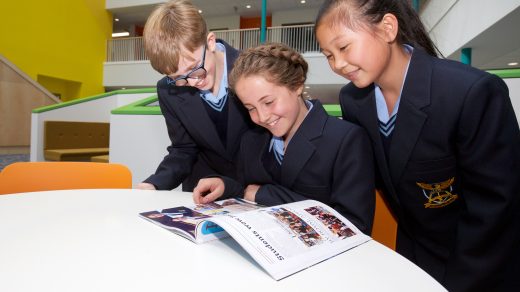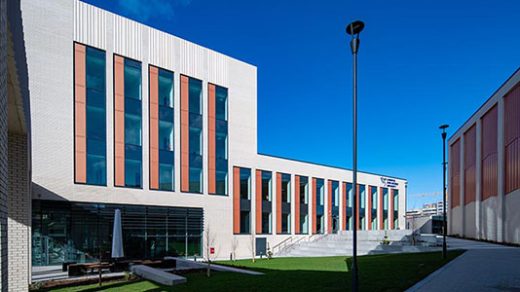Kay Askew, North Liverpool Academy
Kay Askew has been principal at the North Liverpool Academy for six years and with the North Liverpool Academy she is now setting up two new schools in the city, Liverpool Life Sciences UTC and The Studio.
North Liverpool Academy in Everton is one of the largest and best equipped schools in Liverpool if not the country. It has 1400 pupils and specialises in business, enterprise, maths and computing.
The two new schools are set to open September 2013 in the former CUC Building on Greenland Street and will train 14-19 year olds to work in the bio sciences sector and in digital and gaming technology.
Kay believes that schools need to identify emerging industries in their areas and prepare children for the ultimate prize at the end of education which is a job. We must remember that Liverpool was recently involved in the major scientific discovery of the Higgs Bosen particle as well as being a world leader in the development of vaccines and cancer cures.
“We need continually to look at what we’re doing in education to meet the needs of the student and the city in which they live,” says Kay.
Liverpool is also a centre for gaming development and gaming industries need highly skilled people to go directly into employment in their studios.
“If you look at where Liverpool economy sits in the world, we want our children to have the jobs in the city,” says Kay.
“How are we going to help our children to get those jobs? We need to give them the right kind of skills, the right kind of education and make them the right kind of people.”
The Studio is supported by industry partners Sony, Setgo Games, Onteca and Apposing. The Life Sciences UTC is partnered by Merseybio, Unilever, Bristol-Meyers Squibb and the Royal Liverpool and Broadgreen University Hospitals.
It is a new way of teaching 14-19 year olds, but Kay is no stranger to taking on new challenges.
The North Liverpool Academy was only the second academy of its kind to be sponsored by a university in the UK when Kay headed it up from conception to birth.
The academy is sponsored by Liverpool University, educational publishers Granada Learning and Stanley Fink, the chief executive of Man Group plc.
Critics questioned the influence of sponsors on the school’s curriculum and balance sheet yet Kay who has run the school since it first opened its doors in 2006 says that the academies sponsors have brought nothing but good things to the table for the academy.
“Sponsors don’t have an undue influence on the academy they are amazing helpers,” says Kay.
“Our sponsors have only a good impact on our curriculum. They can help with placements and places to source equipment.”
Any North Liverpool Academy student who wants to study at Liverpool University will get a scholarship to attend the university, their fees will be paid and they will be granted bursaries. A selling point indeed for university sponsors when from September 2012 students are facing university fees of up to £9,000 per year.
100 percent of North Liverpool Academy pupils achieve five GCSE’s across the curriculum and 51 percent attain five GCSEs including English and maths. The schools latest OFSTED inspection in January saw it graded as a GOOD school overall.
Kay lives on the Wirral and started her teaching career in Birmingham before becoming the headteacher of Charlton School in Telford. She says the only difference with working at an academy school is that pupils will never be told that there is only one option of study available to them. North Liverpool Academy offers an array of qualifications from BTECS to the International Baccalaureate.
“At an academy there is nobody clouding your horizon saying you can’t do this,” says Kay.
“There is a lot of have you thought about this but there is nobody saying it has to be this way. It’s all about working to meet the needs of the pupils.”
Another original worry with academy schools was that they might be elitist and exclude children who were most in need, but North Liverpool Academy is a flagship school noted for its inclusion policy.
“Like all academies we have to take as many special needs children as possible,” says Kay.
“We take 20 percent special needs children and children from the highest to lowest ability.”
Commenting on the cutting-edge facilities that all three schools enjoy, Kay is quick to remember what is really important.
“It’s not buildings that make good schools it’s the children and the staff,” she says.
“It is great to have excellent facilities as it does make life easier but everything in life is about the people you gather around you. Roger McGough said Liverpool people are the best in the world and I have to agree as my staff and students are fabulous.”




